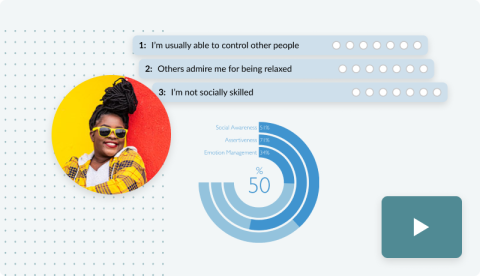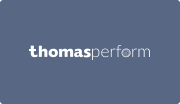Emotional Intelligence Tests & Assessments
Get insight into a person's emotions at work
- Recruit emotionally intelligent leaders
- Create a fully engaged workplace
- Develop effective teams
- Avoid conflicts & confrontation
- Improve business performance
- Create positive group interactions


Check out the latest reviews from our most delighted customers
Thomas' Emotional Intelligence assessment
The Emotional Intelligence assessment, part of our Team Interaction Optimization (TIO) platform can help your business recruit emotionally intelligent leaders and create a fully engaged workforce of effective teams to improve business performance.

How the Emotional Intelligence assessment works
The Trait Emotional Intelligence Questionnaire (TEIQue) measures 15 emotional traits concerning Well-Being, Self-Control, Emotionality and Sociability.
Detailed Reports
Understand a person’s strengths and limitations, how they react under pressure, how well they develop new relationships and how self-motivated and adaptable they are.
No right or wrong answers
There is no right or wrong way of using emotional intelligence. There are positive and negative implications for all the different scores within the questionnaire, which are explained in the reports.
Many different uses
The TEIQue is used for a number of purposes, including appraisals, leadership training, work and life coaching, talent development, measuring employee morale, team building, recruitment and selection and many more.

Assessment Information
- Assessment type: Emotional Intelligence
- Format: 153 questions
- Time to complete: 30 minutes
- Training required: TEIQue Accreditation
Validation:
Registered with the British Psychological Society and audited against technical criteria established by the European Federation of Psychologists’ Associations

The Emotional Intelligence assessment really helps us to get under the skin of a candidate's personality and gives prospective managers an in-depth insight into how a candidate would fit in their team.

Background & Theory
The Trait Emotional Intelligence Questionnaire (TEIQue - pronounced TQ) was developed, and is continually updated, by K.V. Petrides, PhD at his London Psychometric Laboratory, currently based at University College London (UCL).
The TEIQue is based on K. V. Petrides' trait emotional intelligence (trait EI) theory, which views the construct as a constellation of emotional self-perceptions located at the lower levels of personality hierarchies. Trait EI provides a complete operationalization of the affective aspects of personality, meaning that it assesses the emotional world of the individual comprehensively.
Among other psychological characteristics, the TEIQue assesses our beliefs about our emotional abilities (e.g., how good we believe we are at identifying, understanding, and managing our own and other people's emotions). These beliefs are strong predictors of a remarkable range of behaviors and achievements, many of which are vital in the workplace (job performance, job satisfaction, job stress, leadership, organizational citizenship, organizational commitment, teamwork, etc.).

Format of the Emotional Intelligence Assessment
The TEIQue is a self-report questionnaire. Individuals indicate their level of agreement on a 1-7 Likert scale (1 'disagree completely' to 7 'agree completely') with 153 unique items.

Reliability & Validity
The TEIQue is registered with the British Psychological Society (BPS) after it was audited against the technical criteria established by the European Standing Committee on Tests and Testing, part of the European Federation of Psychologists' Associations.
Thomas International conducts on-going psychometric research with the TEIQue. We have previously collaborated with the Psychometrics Centre at Cambridge University www.psychometrics.cam.ac.uk. Please get in touch with [email protected] if you are interested in supporting our continuous development programmes.
Frequently Asked Questions
What is an emotional intelligence test?
Thomas’s Trait Emotional Intelligence Questionnaire (TEIQue) measures 15 emotional traits concerning well-being, self-control, emotionality, and sociability. The TEIQue (pronounced TQ) was developed by K.V. Petrides, PhD, at his London Psychometric Laboratory, based at University College London (UCL).
This test provides insights into a person's emotional strengths and limitations, such as how good we believe we are at identifying, understanding, and managing our own and other people's emotions. It also offers a comprehensive understanding of how we manage relationships, handle pressure, and adapt to new situations. In the context of the workplace, these traits are vital to effectively managing job performance, job satisfaction, job stress, leadership, organizational citizenship and commitment, and teamwork.
How do you test for emotional intelligence?
The Emotional Intelligence assessment (TEIQue) is a self-report questionnaire consisting of 153 questions designed to gauge various emotional traits and tendencies. Each question asks the candidate to indicate their level of agreement on a Likert scale (1 – Disagree Completely to 7 – Agree). The test takes approximately 30 minutes to complete. Your responses are then analyzed to generate a detailed report on an individual's emotional intelligence, highlighting their strengths, weaknesses, and areas for development. The TEIQue provides a reliable and objective measure of an individual’s emotional intelligence capabilities. An emotional intelligence assessment is not a test you can study for, but we recommend completing the questions in a quiet environment, free from distractions.
Why use emotional intelligence testing in the workplace?
An emotional intelligence test provides valuable insight into an individual’s emotional strengths, limitations, and behavioral tendencies in the workplace. It helps organizations understand how employees manage relationships, handle stress, and adapt to change. The Thomas TEIQue generates detailed reports that can be used for personal and professional development, leadership training, performance appraisals, team building, and talent development. The test fosters self-awareness, improved communication, and enhanced emotional well-being among employees.
Did you know? Google's Project Oxygen found that managers with higher emotional intelligence led to a 20% increase in employee engagement and a 30% improvement in team performance.
How do emotional intelligence tests assist in recruitment and development?
During recruitment, these tests help identify candidates with high emotional intelligence who are more likely to excel in roles that require strong interpersonal skills. They provide insights into a candidate's ability to manage emotions, handle stress, and work effectively in a team. In terms of development, emotional intelligence tests pinpoint areas for growth and provide a foundation for targeted training and coaching programs. They contribute to the personal and professional growth of employees, enhancing their leadership capabilities and overall performance.
Is emotional intelligence (EI) more important than intelligence quotient (IQ)?
IQ measures cognitive abilities such as problem-solving, logical reasoning, and critical thinking. EQ focuses on understanding and managing emotions and navigating social interactions effectively. While IQ and EI both contribute to workplace success, they are not interchangeable. Rather, they complement each other, with IQ providing cognitive abilities and technical expertise while EI enhances understanding of interpersonal nuances and facilitates teamwork.
How do I deal with an employee with low emotional intelligence?
Emotional intelligence is a skill that can be taught. Offer constructive feedback with empathy and patience and provide opportunities for EI development through training. Set clear expectations, encourage self-reflection on emotional responses, and monitor progress.
What is the emotional intelligence scale for the workplace?
The emotional intelligence scale assesses self-awareness, self-regulation, motivation, empathy, and social skills. Employees with higher emotional intelligence are often more effective in managing conflicts, communicating effectively, and building positive relationships. EI tests contribute to a harmonious work environment, improved employee engagement, and enhanced team performance.
Can emotional intelligence be improved with training?
Yes! There is potential for EI growth through targeted training and real-world practice. Thomas offers ongoing support for teams and individuals. See the full list of training we offer here.
How does Thomas ensure the confidentiality and ethical use of EI assessment results?
We have extensive measures in place to protect participant privacy. The TEIQue is registered with the British Psychological Society (BPS) after it was audited against the technical criteria established by the European Standing Committee on Tests and Testing, part of the European Federation of Psychologists' Associations. As such, we are committed to the ethical and confidentiality standards set by these institutions.
How can Thomas help with emotional intelligence testing?
Through our TEIQue assessment, we provide organizations with a reliable and scientifically validated tool to measure emotional intelligence. Our comprehensive reporting highlights a candidate’s emotional strengths, weaknesses, and development areas. Additionally, Thomas provides accreditation training for administering and interpreting the TEIQue assessment, enabling organizations to effectively utilize emotional intelligence tests in their recruitment, development, and talent management processes. Contact a member of our team to start making data-led decisions for enhanced employee performance.



